
Neri

by Runa 59
Runa Photography, Daniel © 2018
© All rights reserved, don´t use this image without my permission

by Runa 59
Runa Photography, Daniel © 2018
© All rights reserved, don´t use this image without my permission
The Convent of San Felipe Neri is a neoclassical style church built between 1795 to 1799, by Friar Antonio de San José Alberto.
San Felipe Neri was built using stone from Mount Churuquella, and later covered with a layer of stucco. Originally a monastery, the convent now functions as an all-girls parochial school.
The entrance houses a painting of the last supper. inside, a flower-trimmed courtyard sits surrounded by two levels of white arched corridors. A large number of paintings from the 18th and 19th century adorn the inside of the monastery.
The main draw-card of San Felipe Neri is the excellent panoramic views of the city from the brick-floored rooftop and bell tower.
Source: Sucre Life

by Runa 59
Runa Photography, Daniel © 2018 © All rights reserved, don´t use this image without my permission
A Sucre
Cuatro nombres muy gloriosos Tiene nuestra Capital Son: La Plata, Charcas,Sucre Chuquisaca la inmortal Quimba
Te llaman la culta Atenas Por tu saber inmortal tu rompiste las cadenas y nos diste Libertad.
Simeón Roncal (Bailecito)

by Runa 59
Runa Photography, Daniel © 2019
© Some rights reserved, don´t use this image without my permission
The Convent of San Felipe Neri is a neoclassical style church built between 1795 to 1799, by Friar Antonio de San José Alberto.
San Felipe Neri was built using stone from Mount Churuquella, and later covered with a layer of stucco. Originally a monastery, the convent now functions as an all-girls parochial school.
The entrance houses a painting of the last supper. inside, a flower-trimmed courtyard sits surrounded by two levels of white arched corridors. A large number of paintings from the 18th and 19th century adorn the inside of the monastery.
Source: wikipedia
Thanks to all Phoide contributors to Neri!
Most notably Runa 59.






